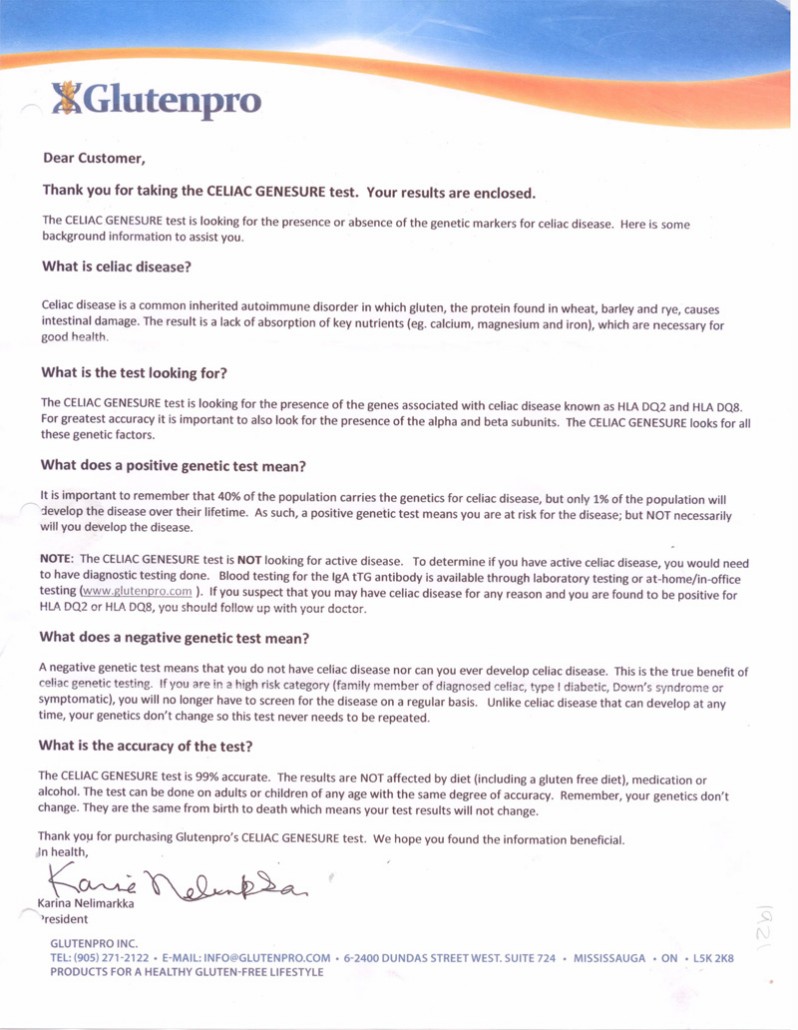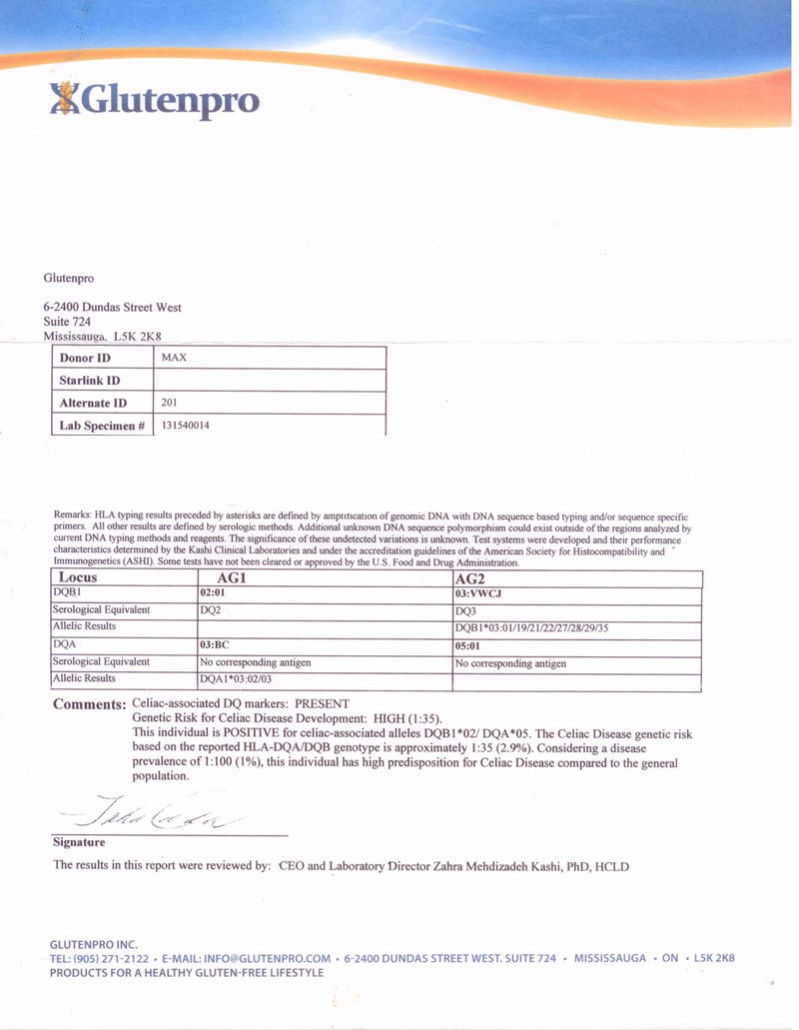Results of GENESURE® Cheek Swab Test for Celiac Disease Are In for ‘Son of a Celiac!’
 With the optimism of youth, Max was hoping that the GENESURE® genetic test would reveal that he carries neither the HLA-DQ2 or HLA DQ8 genetic marker for Celiac disease. That would essentially guarantee that he would never go on to develop the disease, even though he is the son of a celiac – ME.
With the optimism of youth, Max was hoping that the GENESURE® genetic test would reveal that he carries neither the HLA-DQ2 or HLA DQ8 genetic marker for Celiac disease. That would essentially guarantee that he would never go on to develop the disease, even though he is the son of a celiac – ME.
Just ten days after Max’s cheek swab samples were submitted to GlutenPro, the results of the cheek swab samples arrived. Will the love affair between ‘Son of a Celiac’ and his favourite barley sandwich be cut short or will his genetic test results drive him to drink? See for yourself!
Background:
• Risk Factors for the Development of Celiac Disease in Children
• Son of a Celiac – the Case For Genetic Testing
• Home Instructions for Genetic Testing by GENESURE®


• Celiac-associated DQ markers: PRESENT
• Genetic Risk for Celiac Disease Development: HIGH
• This individual is POSITIVE for celiac-associated alleles DQB1 *02/DQA * 05.
• The Celiac Disease genetic risk based on the reported HLA-DQA/DQB genotype is approximately 1:35 (2.9%).
• Considering a disease prevalence of 1:100 (1%), this individual has high predisposition for Celiac Disease compared to the general population.
Not quite the peace of mind he had been hoping for but perhaps early enough to consider a career in the gluten-free beer industry! I vote for Bard’s Beer, the very best in 100% gluten-free beer!
For the moment, with no symptoms and negative prescreening blood tests, Max will carry on enjoying his good ‘gluten life.’ Every 3-5 years, he will ask to be retested for the antibodies associated with the disease, as recommended by Island Health here in Victoria, Vancouver Island and the Gulf Islands in British Columbia. In the interim, should he develop any of the myriad symptoms that suggest that the disease may have been been activated, Max knows to ask his care provider to run the tests again. While celiac disease may not be on anyone’s wish list, Max and his sister know that their mother’s diagnosis + their awareness will fast track them to their own diagnosis, expedite their recovery and reduce the risk of developing associated disorders, they already know just how great the gluten-free lifestyle can be having witnessed it first hand!
What are the blood tests for Celiac disease*? 
There are two blood tests that measure the presence and quantity of ‘army’ of auto-immune cells that gluten triggers in individuals with CD:
• tTg: IgA anti-transglutaminase antibody tes
• Total Serum IgA
While these blood tests are very sensitive, they are not 100% accurate. If the tTg test is positive or the IgA test shows a deficiency, a duodenal biopsy is required to make a definitive diagnosis. Collected under mild sedation, evidence of the damage that gluten creates in the microvilli and larger villi provides a definitive diagnosis. Printer-friendly version Blood Tests for Celiac Disease.
 IMPORTANT: It is essential that the blood test and the biopsy be performed before removing gluten from your diet. Starting on the gluten-free diet prior to testing can interfere with making an accurate diagnosis. If you have already removed or reduced the gluten in your diet, medical experts recommend a gluten challenge, prior to both the blood tests and the duodenal biopsy.
IMPORTANT: It is essential that the blood test and the biopsy be performed before removing gluten from your diet. Starting on the gluten-free diet prior to testing can interfere with making an accurate diagnosis. If you have already removed or reduced the gluten in your diet, medical experts recommend a gluten challenge, prior to both the blood tests and the duodenal biopsy.
Adults – 10 grams of gluten (4 slices of bread or equivalent) for at least 1 month prior.
Children – 5 grams of gluten (2 slices of bread or equivalent) for at least 1 month prior
If you have been on a gluten-free diet for a long time it may take 2-3 months on a gluten challenge to turn the tTg and biopsy positive. Because it can be very uncomfortable to reintroduce gluten to one’s diet, it is strongly recommended that you consult your medical care provider about being prescreened for CD BEFORE removing gluten from your diet. The gluten challenge is truly ‘a challenge.’
Symptoms associated with Celiac disease:
 • abdominal pain, bloating and gas
• abdominal pain, bloating and gas
• bone and/or joint pain
• canker sores
• chronic fatigue and weakness
• diarrhea, constipation or both
• easy bruising of the skin
• elevated liver enzymes
• indigestion/reflux (heartburn)
• infertility (in both women and men
• iron, folate and/or vitamin B12 deficiency
• lactose intolerance
• menstrual irregularities
• migraine headaches
• nausea and vomiting
• other vitamin and mineral deficiencies
• recurrent miscarriages
• swelling of hands and feet
• unexplained iron deficiency
• weight loss, although 30% of celiacs are above their ideal weight at the time of diagnosis
Additional symptoms in children:
• concentration and learning difficulties
• delayed puberty
• dental enamel abnormalities
• failure to thrive (delayed growth and short stature)
• irritability and behavioural changes
Also by GlutenPro
 CeliacSure: This Celiac Test is as accurate as tests performed in a hospital laboratory. It is safe, affordable & simple to use and can be carried out in the convenience of your own home in just 10 minutes. Whether your Celiac Test result is positive or negative, you will have a better sense of whether Celiac disease may be the cause of your symptoms.
CeliacSure: This Celiac Test is as accurate as tests performed in a hospital laboratory. It is safe, affordable & simple to use and can be carried out in the convenience of your own home in just 10 minutes. Whether your Celiac Test result is positive or negative, you will have a better sense of whether Celiac disease may be the cause of your symptoms.
 EZ Gluten Test Strips: In the EZ Gluten® Test, a food sample is ground to a fine consistency, added to the gluten extraction solution, and then mixed. A few drops of the sample extract are placed into a test tube. The EZ Gluten® test strip is placed into the test tube and allowed to absorb the sample extract. After 10 minutes, the test strip can be read visually for the presence of gluten in the sample.
EZ Gluten Test Strips: In the EZ Gluten® Test, a food sample is ground to a fine consistency, added to the gluten extraction solution, and then mixed. A few drops of the sample extract are placed into a test tube. The EZ Gluten® test strip is placed into the test tube and allowed to absorb the sample extract. After 10 minutes, the test strip can be read visually for the presence of gluten in the sample.















